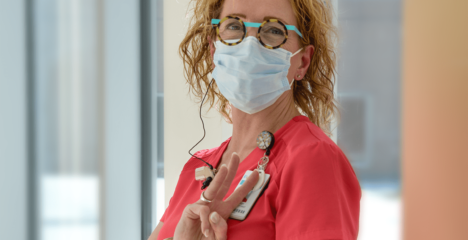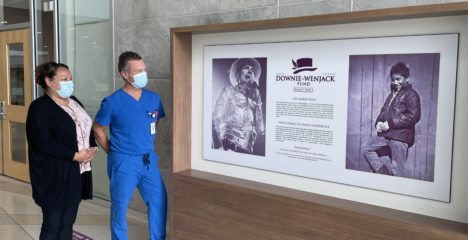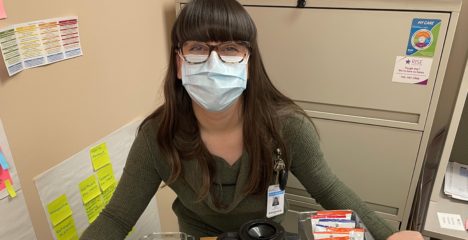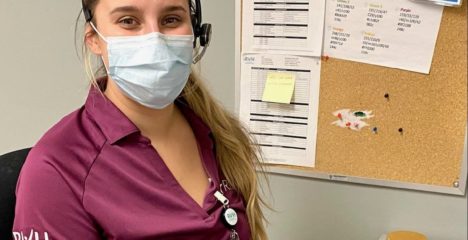Our People
Value People
We will ignite new levels of passion, pride and performance in our skilled and dedicated TEAM RVH. We will strive to be the best place to work, practice, volunteer, learn and receive care.
You Belong Here – Diversity, Equity, Inclusion & Belonging at RVH
Previous Stories from 2021-2022 Annual Report

At RVH you don’t need to fit in; you simply belong.
RVH is working hard to ensure all staff, physicians and volunteers feel comfortable being their authentic selves and to get that message across has embarked on a new “Belonging” campaign.
“It doesn’t matter how you come through the doors at RVH”, says Darrell Sewell, Vice President of Facilities, Chief Human Resources Officer and Chair of RVH’s to call it the Diversity, Equity, Inclusion and Belonging (DEIB) Council. “Whether you’re a patient, visitor, or member of TEAM RVH, we strive to ensure you feel like you belong here. It’s important people don’t “change” who they are, but instead “be” who they are.”
RVH’s inspirational Belonging campaign features members of TEAM RVH sharing how they self-identify as well as their real and often emotional stories of diversity, equity, inclusion and belonging at RVH. No matter how a member of TEAM RVH identifies, the campaign aims to support a health centre-wide culture where people feel safe and valued.
“If there is one thing I have learned, it is to never underestimate the power and passion of TEAM RVH,” says Stephanie Jackson, Senior Administrative Assistant and member DEIB Council since 2018. “The conversations around the table have grown over time and we have fostered a safe space where TEAM RVH can be vulnerable, listen to different perspectives, seek to understand each other and find solutions to overcome challenges all while celebrating how wonderfully human we are.”
In terms of the council itself, it has been a bit of an experiment. Morphing from a structured council membership of mainly hospital leaders, the council now practices an open membership policy where anyone in the organization is free to participate, at any time and in any way they want.
“When the council first started, we were addressing diversity and inclusion through six distinct pillars,” says Sewell. “In reality, people don’t neatly fit into six categories and they shouldn’t be made to feel like they need to. By focusing on belonging, we are demanding the organization supports everyone to show-up as their true, authentic self.”
Over the past several years, the council’s efforts have focused on education, advocacy and celebration. However, as the demographics of the region and the local workforce continue to rapidly change, they recognize there is still a lot more work to do.
“This initiative is not something RVH is simply paying lip service too,” says Sewell. “The organization is truly committed to a culture of belonging.”
So much so that RVH is recruiting its very first Director of Diversity, Equity, Inclusion and Belonging. Meanwhile, there are many initiatives underway, such as monthly cultural celebrations and days of recognition, ongoing education, the implementation of a gender identity and expression policy, and recruiting more participants for the Belonging campaign.
“When TEAM RVH can truly be their authentic and genuine self,” says Sewell, “only then can they fully contribute and give of themselves to their patients in the delivery of care, and to each other as colleagues in the workplace.”
Watch two of RVH’s I Belong stories:

Unmarked graves are telling a story about Canada’s dark history and RVH wants to ensure its workforce and visitors to the health centre are reminded of their own role in reconciliation.
Pausing to remember is the first step.
RVH, in partnership with The Gord Downie & Chanie Wenjack Fund, the Indigenous Health Circle and the Barrie South Simcoe Métis Council, established the Gord Downie & Chanie Wenjack Fund Legacy Space. This installation in the health centre offers everyone an opportunity to pause and reflect on Indigenous history and reconciliation in Canada.
“RVH is the first public healthcare centre in Canada to install this Legacy Space which aims to build cultural understanding and create a path toward reconciliation between Indigenous and non-Indigenous people,” says Janice Skot, RVH President and CEO. “RVH will continue to take every opportunity to further this conversation and support truth and reconciliation.”
RVH is working with its Indigenous partners to co-design spaces, protocols and programs to ensure cultural safety and appropriateness in all we do:
- Cultural competency training courses
- Medicine Wheel Teachings
- Development of a smudging policy
- Creation of the Healing Circle garden
- Educational videos on Indigenous self-identification
“I was passionate about bringing a Legacy Space to RVH as a welcoming symbol and something that can put people at ease that we’ve acknowledged the past traumas and are working together to move forward,” says Dr. Matt Follwell, radiation oncologist and Chief of Oncology, who initiated the installation. “We have a long way to go and the Legacy Space will act as a catalyst on RVH’s journey towards truth and reconciliation.”
The Legacy Space was unveiled during Secret Path Week, a national movement commemorating the legacies of Gord Downie and Chanie Wenjack and the journey all Canadians need to take towards truth and reconciliation.
“I am honoured to be part of the team celebrating the launch of the first Gord Downie & Chanie Wenjack Fund Legacy Space in a health care setting,” says Roberta Manitowabi-Roote, RVH’s Indigenous Patient Navigator. “This launch is an important step toward truth and reconciliation, providing space and opportunity for reflection and Indigenous cultural safety education for TEAM RVH. I am hopeful that we will inspire health centres across Canada to do the same.”
The installation is currently in RVH’s main lobby, but can be moved around the health centre to ensure all members of TEAM RVH and the public have the opportunity of reflection.
“We are so grateful to the team at RVH for creating the first Legacy Space in a healthcare setting,” says Sarah Midanik, president & CEO of the Gord Downie & Chanie Wenjack Fund. “The addition of this Legacy Space inside the hospital expands upon their deep commitment to reconciliation, and their important work in serving Indigenous people in Barrie, one of the largest Indigenous populations in Ontario.”
To learn more about the Legacy Spaces program please visit https://downiewenjack.ca/

It’s just a cart filled with snacks and mental health resources, but what it offers is a moment for members of TEAM RVH to step away from their hectic day for a much-needed moment of self-care.
After more than two years of working and living in a pandemic TEAM RVH is exhausted. To acknowledge that it’s been a long haul and to offer small comfort measures the Lavender Cart program was established.
“The original purpose of the cart was to take it up to units after a critical incident, a time when staff experience a lot of extra stress. When we bring the cart up to a unit or department, we provide the team with the opportunity to take a moment to care for themselves,” says Gina D’Antonio, Psychological Safety Consultant, with Occupational Health & Wellness. “With the level of stress and the staffing challenges we are currently facing, we decided to offer the cart to any team who feels they could benefit from it.”
That care could be as simple as grabbing a snack or a cup of tea off the cart during a hectic day; taking time to participate in a mini-labyrinth activity or a meditative colouring exercise; to talking about mental health concerns and accessing some of the resources on the cart. It’s all about TEAM RVH choosing the comfort items they need at the time.
As part of the Lavender Cart’s comfort measures, TEAM RVH can also choose one of the Indigenous Healing Kits created by Roberta Manitowabi, RVH’s Indigenous Patient Navigator.
“These kits have sage in them which we use for positivity, cleansing of our spirit and for prayer to the Creator,” says Manitowabi. “There is also a tobacco tie which we use as a prayer offering to the Creator. We place the tobacco in our left hand and then offer that tobacco to Creator by placing it by a tree for that prayer. It is also used in asking for assistance from an Indigenous elder or knowledge keeper.”
Recognizing that TEAM RVH may not be able to smudge right away because the traditional ceremony used for purifying or cleansing the soul involves the burning of sage, Manitowabi has included a bottle of Sweet Grass Spray which can be used instead. Like using essential oil spray, the combination of sage, tobacco, sweet grass and cedar is used for stress reduction.
“We use it for its calming influence, and it gives you a sense of peace. You can use it when you pray,” says Manitowabi. “Right now, people are really struggling, and mental health issues are on the increase. I am happy that these kits are making a difference in some small way to help TEAM RVH through this time.”
The pandemic has been grueling for RVH staff and physicians causing the acute stress often experienced during a critical event.
“I requested the Lavender Cart for the Emergency department because, as we all know, it has been really hard on our frontline clinical staff, not only during this current wave, but for the last two years. Having what feels like the hardest wave yet, which is also during the most critical staffing time we have seen in healthcare, has added to the staffs’ level of burnout and stress,” says Sharon Ramagnano, Manager, Emergency Department. “Right now the focus on retention and the wellbeing of our staff, physicians and leaders is paramount and the Lavender Cart coming around is one small thing we can offer to our staff on a regular basis that I feel helps them to know that RVH really does care.”
D’Antonio adds, “This cart does not solve all the issues TEAM RVH is facing. It doesn’t fill the staffing shortages or get rid of the pandemic, but it can provide a bit of relief. The point is to take a moment to recognize what you need from the cart and take it – sometimes you don’t even realize you need something until you’re presented with the opportunity.”

Working in healthcare during a pandemic has tested the resolve of the most seasoned professionals. To support its staff and physicians, RVH introduced a unique program which offers peer-to peer support.
RVH is the first, and currently the only hospital in Canada, to formally implement the RISE (Resilience in Stressful Events) program created by Johns Hopkins Medicine and supported by the Maryland Patient Safety Center.
“When the COVID-19 pandemic was declared in March 2020, we never imagined its severity, its length, or its impacts,” says Janice Skot, RVH President and CEO. “And yet, I’m struck by the incredible courage, compassion and commitment of healthcare teams across Ontario despite the ongoing challenges they face. However, we can’t underestimate the pandemic’s impacts on healthcare workers.”
Despite remarkable dedication to patient care, RVH recognized TEAM RVH needed extra support – in mind, body and spirit. A wellness survey showed 80 per cent of respondents were worried about their own, or a family member’s, mental health.
“While our team cared for more than 1,100 COVID-19 positive patients within the first two years, faced constantly changing information and shifting directives and spent long hours in hot PPE, they were also dealing with isolation, lack of social interaction, online school and tremendous uncertainty like everyone else,” says Skot. “We knew we needed to do more to support our entire workforce so we enlisted people across the organization to create the Caring for YOU Committee.”
RVH began recruiting volunteers for the program in March 2021 and by June had 36 peer responders, trained by the Johns Hopkins RISE Team, ready to take a phone call from a colleague in crisis. RVH’s RISE Peer Responder team includes physicians, clinical and non-clinical staff, all who have been carefully selected for their passion for the wellbeing of their colleagues.
“Working in healthcare, coupled with daily life, poses many stressors, and sometimes this can just get to be too much. Staff need a safe outlet they can rely on every day, in times of need. The RISE Peer Responders program provides just that,” says Alex Taylor, RVH Security Officer.
RISE Responders are not counsellors or therapists, but they are trained to listen and offer support when a peer is experiencing a stressful or difficult situation and, if required, they refer the caller to more specific resources.
“We need this now more than ever,” says RISE Responder Emily Bodrug, RN. “I was so nervous at first, but my first call was from someone who just needed to talk to someone. Our chat made a huge difference for that person. They said it was important for them to get that weight off their chest.”
The goal of RISE is to help TEAM RVH one call at a time. That philosophy appeals to Dr. Ana Igric, a physician in RVH’s Intensive Care Unit.
“Who better to support a colleague through a difficult experience than someone who is a peer and may have had those same feelings or experienced something similar?” says Dr. Igric. “I feel this program can complement an individual’s journey to wellness and resilience in the face of stress at work. I love that the program is staffed by colleagues from many different disciplines and areas of the hospital, who have volunteered to support their colleagues.”
While the calls are anonymous, some callers have shared their impact.
“After a tough phone call with a patient expressing thoughts of self-harm, I was a little rattled and needed to talk about it. I was really nervous to call RISE, but talked myself into it and I am so glad I did,” says one caller. “The person who answered didn’t ask me any personal questions, not even my name. She listened patiently, told me I had made a good decision to call her, expressed compassion and empathy for how I was feeling and made sure I had a strategy in place for some rest and decompression later that day. It was truly the most supported I have ever felt after a tough moment at work.”
While RISE was established during the pandemic, RVH will continue to offer the program given the high-pressure, high-stakes world of healthcare.
“Healthcare is very rewarding, but it can also be very demanding and stressful. At RVH, we want to ensure our team is as healthy as they can be and ready to provide the high-quality, patient-centred care the people of this region have come to expect,” says Skot. “I’m so proud of our RISE program and our volunteer peer responders. Each time they take a RISE shift, they exemplify RVH’s values and this peer support program will help our team continue to face our challenges.”